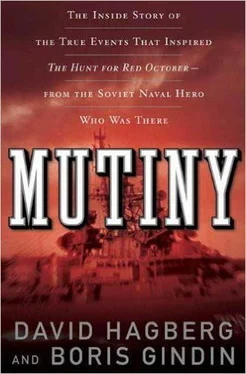A couple of days later Gindin is called up to the bridge. “We have a small problem, Boris,” the captain starts out pleasantly enough, but Gindin’s stomach does a slow roll. He has a pretty good idea what’s coming next. The cook has been complaining to Potulniy that potatoes keep disappearing and he doesn’t know where. Every night Gindin’s inventive sailors sneak up to the pantry area where the potatoes are kept under lock and key. These are the engineering crew, so it’s no trouble for them to break into the locked boxes, steal some potatoes, and then fix the locks so no one can tell what’s happened.
The only bad luck was that the captain was wandering around the ship in the middle of the night and passing the machinery room smelled the frying potatoes.
“They’re young boys and they were hungry,” Gindin admits. “And I had some, too, sir.”
Potulniy barely smiles. “It will not happen again, Boris. Do I make myself clear?”
“Perfectly, Captain,” Gindin replies.
So the captain was aware of what was going on aboard his ship, but the difference between him and Sablin was that the zampolit would have understood and probably would have joined the men for an early-morning snack of fried potatoes if for no other reason than to find out how the crew was doing.
But there’s something about Russians that’s fairly well universal, if not practically eternal: They’re usually more complicated than they seem at first glance. Certainly after four and a half centuries of hardships and deaths, naval officers may be the most complex of Russians. All along they’ve had to balance their jobs of protecting the Rodina, whether it be from Turkey or Sweden or Germany or the United States and NATO, with protecting themselves from their own government, whether it be run by a tsar or a Communist Party Secretary.
Potulniy is no exception. On the one hand, he is aloof from his men, while on the other, he understands they are all his responsiblity. The Storozhevoy, his ship, includes his men, and he’ll never blame his crew for his own mistakes.
It was 1974 when the Storozhevoy was ordered out of his base at Baltiysk for a short training cruise of just a few hours. It was a fairly common occurrence between deployments, mostly to maintain crew efficiency and check on repairs and new equipment. The Storozhevoy is fitted with four gas turbine engines. Two of them, called marching engines, produce 18,000 horsepower and are used for normal cruising. The other two are boost engines developing 36,000 horsepower and are used for battle conditions when more speed is needed.
One of the boost engines was down, and the mechanical crew was having trouble finding the problem. At the time, Captain Lieutenant Alexander Ivanov was in control of all BCH-5, but the engines were Gindin’s responsiblity. Ivanov reported the downed gas turbine to Potulniy and, according to regulations, to the assistant division commander on shore, who gave the go-ahead for the brief mission anyway.
The shakedown cruise goes without a hitch until they head back and are about fifteen minutes from the dock, when both marching engines break down and neither will restart.
It’s Gindin’s rotation and as the ship loses control he reports the situation to the captain, who orders the anchor to be immediately lowered. They are in the narrow cut leading to the base, and the wind is shoving them toward the land. When the anchor bites, the Storozhevoy turns broadside, completely blocking the ship channel.
Gindin starts the boost turbine, which is the only operational engine left, so that they will have power, and he and his crew attack the problem with the stalled marching engines. Twenty minutes later they get one of the engines started, and shortly after that the second, which puts them where they began—with two marching engines but with only one boost turbine.
He radios Potulniy on the bridge. “Captain, I have the two marching engines on line again.”
“What about the boost engines?” Potulniy demands, and Gindin can hear the strain in his voice.
“Only one of them is working. The other one is still down.”
“How soon will it be operational, Boris?”
“I don’t know,” Gindin has to admit.
In this instant Potulniy’s career is on the line. The Soviet navy high command is not forgiving of its officers who make embarrassing mistakes. Of course the problem with the boost engine could be blamed on the gas turbine crew, and the problem returning home from the short cruise could be blamed on the assistant division officer. In any navy it’s called covering your ass, prekrit cvoju zadnicu, and Russian ship captains know how it’s done.
But right now Potulniy is faced with staying where he is and blocking the narrow ship channel or getting under way in the hopes that the marching engines won’t quit again.
He opts to stay put and call for the gas turbine manufacturer’s rep on base to be brought out to the ship to fix the problem. It takes the expert all night to resolve the issue, and in the morning the Storozhevoy makes his way into base with all his engines up and running. And there were no repercussions from Division Headquarters. In this instance Potulniy acted as a man of steel, taking complete responsibility for everything and everyone aboard his ship.
Yet six months later, on their cruise to Cuba, Potulniy shows a completely different side. More a man of cotton than steel, Gindin thinks. The Cubans expect a representative from the ship. This is a social occasion with everyone in dress uniforms, and it’s a holiday—International Women’s Day—and on the list of dignitaries the Russian representative will have to meet is the wife of Fidel Castro, the wife of the commander of the Cuban Fleet, and the wife of the minister of defense. It’s a big job, one that the captain should take responsibility for. But this time Potulniy shrugs it off. Maybe he’s too shy.
He calls Gindin up to the bridge first thing in the morning after exercises and breakfast. “I have a big job for you, Boris,” he says. “An important one, representing our ship.”
“Sir?”
“Take it easy; you’ll do just fine,” Potulniy assures a totally mystified Gindin. “The Cuban government is sending a car for you at eleven hundred sharp. Dress in your holiday uniform and get something to take to the ladies.”
By now Gindin’s palms are cold and sweaty and his heart rate is up. Fixing a ship in mid-ocean after a collision is one thing, but what the captain is asking him to do now is downright nerve-racking. “Something for the ladies, sir?”
Potulniy waves it aside. “Go see our zampolit; he’ll know what you should bring.”
Gindin wants to ask the captain why Sablin shouldn’t be the one to go, but by now Potulniy has turned away to deal with some minor problem with his ship. Who knows? Maybe the captain’s palms are even wetter than Gindin’s. And maybe the captain figures that Gindin isn’t shy and his easygoing, social personality makes him the best man aboard ship for the job.
Of course Sablin knows exactly what to do, and when the car comes for Gindin at precisely 11:00 A.M. he’s carrying flowers for the wives, as well as Russian nesting dolls, chocolates, Russian champagne, and vodka.
It was ninety-eight in the shade that day, the car was not air-conditioned, and although Gindin does not have to wear a uniform coat he does have to wear a tie with his white shirt and a jacket showing the three stars of his rank, black trousers, and a cap with gold embroidery. And he’s a Russian. What does he know about this kind of weather? Besides that, he’s very nervous and the translator, sent along to make sure he pronounces names correctly, is relentless.
Читать дальше












